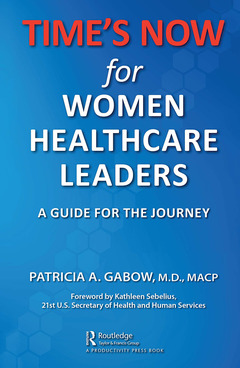TIME'S NOW for Women Healthcare Leaders A Guide for the Journey
Auteur : Gabow Patricia A.

TIME?S NOW for Women Healthcare Leaders: A Guide for the Journey
Women comprise over 80 percent of healthcare frontline employees, but they often hit the proverbial glass ceiling. Only 30 percent of healthcare C-suite Executives and less than 15% of CEOs are women. Moreover, while 51 percent of medical students are women, only 16 percent of the Department Chairs and Deans are women. Clearly, women are facing barriers to achieving their potential, limiting their ability to add their unique talents and skills to the tables of leadership. The author provides extensive detail on these barriers and approaches to their solutions. This is a practical "how-to" book that will help women in healthcare envision their ability to contribute and inspire them to lead. The author sees this as not only helping women, but also facilitating solving healthcare?s myriad problems, improving health and benefitting society.
***
This book is a must-read primer for women seeking leadership. It is practical, thought provoking, and carefully researched, addressing why women?s leadership is important and how women can be better leaders. Gabow?s approach capitalizes on interviews with strong women leaders. She uses the notions she learned from the interviews coupled with research from the literature to create an easy-to-read, motivating, and challenging book for women and men!
Nancy Agee
President and CEO Carilion Clinic
Past Chair American Hospital Association
TIME?S NOW for Women Healthcare Leaders is filled with powerful examples of how women have overcome multiple obstacles and prevailed on their leadership journeys. It is a MUST read for women and men about the obstacles to be overcome, potholes to avoid, and the shout outs to be given to women who every minute, every hour, every day are committed to human caring. It has captured the heart and spirits of women from diverse backgrounds who have and continue to demonstrate their commitment to making society a better place for all!
Linda Burnes Bolton, DrPH, RN, FAAN
Senior Vice President and System Chief Equity Officer Cedars Sinai Health System
This highly engaging book addresses the relative dearth of women leaders in healthcare through thoughtful assessment of how leaders? values and actions can improve healthcare within healthcare organizations and systems. Dr. Gabow, an exceptional leader whose relentless passion for excellence for patients served by Denver Health earned her national renown, combines insightful observations from her own path with current statistics about women in medicine, experiences of other successful women leaders, and mentoring skills to offer wise counsel to all current and future leaders. The thoughtful distillation of practical wisdom offered here make this book a unique contribution and highly relevant to healthcare in America today.
Carolyn Clancy, M.D.
Past Director, Agency for Healthcare Research and Quality
This insightful book is full of personal stories, honest reflections, and data-driven guidance from and about women leaders. It serves as a wonderful resource for those motivated to advance diverse and inclusive organizations.
Karen DeSalvo, M.D., MPHChief Health Officer, Google Health
Past Acting Assistant Secretary for Health, US HHS
National Coordinator for Health Information Technology, US HHS
Foreword. Acknowledgements. Author. Introduction. Chapter 1: Why Should Women Lead. Chapter 2: Lay of the Land. Chapter 3: Obstacles and Opportunities. Chapter 4: First Things First. Chapter 5: You Can’t Parachute into Leadership. Chapter 6: Now You Are a Leader. Chapter 7: Even Leaders Have a Boss. Chapter 8: Making the Trains Run on Time and Laying New Tracks. Chapter 9: Sharing and Receiving Lessons Learned. Chapter 10: Remember the Obvious. Chapter 11: Reflections of Women Leaders. Appendix. References. Index.
Patricia A. Gabow, MD, MACP, retired, is formerly the CEO of Denver Health. Her career has had four distinct components. The first two components, which overlapped temporally, were as an academic practitioner and researcher in the area of renal disease with emphasis initially on disorders of body fluid and electrolyte balance and subsequently on autosomal dominant polycystic kidney disease. She was Principal Investigator on the largest clinical NIH Program Project Grant in Polycystic Kidney Disease for 15 years, which produced seminal observations on the systemic nature of the disease, the disease in children, the disease progression and modulators and the genetics of the disorder.
The third component of her career was as physician leader. This phase began with the role of Director of the Medical Services (Chair), Medical Director of a health care system (Chief Medical Officer), and finally as the CEO of a large integrated public system. During her leadership, she led a system transformation changing a struggling public hospital system into a model integrated, high quality, fiscally stable system. This was accomplished in a series of initiatives: managing finances to put the system in the black where it remained for her 20 years of leadership despite providing $4.7 billion of uninsured care; moving the entire integrated delivery system from a city government department which it had been for 135 years to an independent governmental entity, enabling flexibility and innovation while maintaining public accountability; investing over $300 million dollars in the physical plant which created state-of-the-art facilities for vulnerable populations; investing over $400 in information technology to provide robust data and tools to improve quality, accountability, and efficiency; and creating and adopting innovations such as advice nurse lines, school-based clinics, standardized computer order sets, and Toyota Production/Lean to improve the accessibility, qual
Date de parution : 01-2023
15.6x23.4 cm
Disponible chez l'éditeur (délai d'approvisionnement : 14 jours).
Prix indicatif 37,68 €
Ajouter au panierDate de parution : 04-2020
15.6x23.4 cm
Thèmes de TIME'S NOW for Women Healthcare Leaders :
Mots-clés :
healthcare's myriad problems; healthcare frontline employees; medical students; women healthcare leaders; Medical Legal Partnership; Denver Health; ICU Nurse; National Academy; HHS; CNO; Ceo Tenure; Safety Net Institution; Malala Yousafzai; Insulin Costs; Healthcare Leaders; Imposter Syndrome; Physician Leader; Healthcare Entities; Women Physicians; Rapid Improvement Events; Women Healthcare; Female Ceo; Ceo Position; Ceo Level; Nelson Mandela; Highest Impact Medical Journals; Young Men; Child Care Aware; Care Takers
